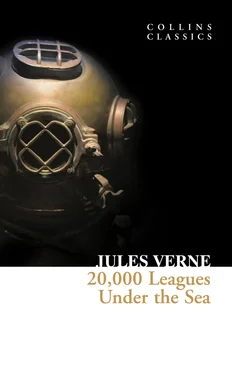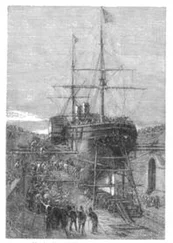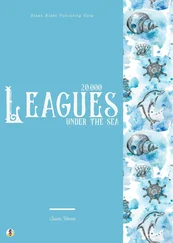‘You are doubtless unaware,’ I answered, ‘of the commotion you have caused in Europe and America. When the Abraham Lincoln pursued you on the high seas, every one on board believed they were pursuing a marine monster.’
A slight smile curled round the commander’s lips, then he went on in a calmer tone, –
‘Dare you affirm, M. Aronnax, that your frigate would not have pursued a submarine vessel as well as a marine monster?’
This question embarrassed me, for it was certain that Captain Farragut would not have hesitated. He would have thought it as much his duty to destroy such a machine as the gigantic narwhal he took it to be.
‘You see, sir,’ continued the commander, ‘I have the right to treat you as enemies.’
I answered nothing, and for a very good reason; the unknown had force on his side, and it can destroy the best arguments.
‘I have long hesitated,’ continued the commander. ‘Nothing obliges me to give you hospitality. I could place you upon the platform of this vessel, upon which you took refuge; I might sink it beneath the waters and forget that you ever existed. I should only be using my right.’
‘The right of a savage, perhaps,’ I answered, ‘but not that of a civilised man.’
‘Professor,’ quickly answered the commander, ‘I am not what is called a civilised man. I have done with society entirely for reasons that seem to me good, therefore I do not obey its laws, and I desire you never to allude to them before me again.’
This was uttered clearly. A flash of anger and contempt had kindled in the man’s eyes, and I had a glimpse of a terrible past in his life. He had not only put himself out of the pale of human laws, but he had made himself independent of them, free, in the most rigorous sense of the word, entirely out of their reach. Who, then, would dare to pursue him in the depths of the sea, when on its surface he baffled all efforts attempted against him? What armour, however thick, could support the blows of his spur? No man could ask him for an account of his works. God, if he believed in Him, his conscience, if he had one, were the only judges he could depend upon.
These reflections rapidly crossed my mind, whilst the strange personage was silent, absorbed, withdrawn into himself. I looked at him with terror mingled with interest, doubtless as Oedipus considered the Sphinx.
After a rather long silence the commander went on speaking.
‘I have hesitated, therefore,’ said he, ‘but I thought that my interest might be reconciled with that natural pity to which every human being has a right. You may remain on my vessel, since fate has brought you to it. You will be free, and in exchange for this liberty which, after all, will be relative, I shall only impose one condition upon you. Your word of honour to submit to it will be sufficient.’
‘Speak, sir,’ I answered. ‘I suppose this condition is one that an honest man can accept?’
‘Yes; it is this: It is possible that certain unforeseen events may force me to consign you to your cabin for some hours, or even days. As I do not wish to use violence, I expect from you, in such a case, more than from all others, passive obedience. By acting thus I take all the responsibility; I acquit you entirely, by making it impossible for you to see what ought not to be seen. Do you accept the condition?’
So things took place on board which were, at least, singular and not to be seen by people who were not placed beyond the pale of social laws.
‘We accept,’ I replied. ‘Only I ask your permission to address to you one question – only one. What degree of liberty do you intend giving us?’
‘The liberty to move about freely and observe even all that passes here – except under rare circumstances – in short, the liberty that my companions and I enjoy ourselves.’
It was evident that we did not understand each other.
‘Pardon me, sir,’ I continued, ‘but this liberty is only that of every prisoner to pace his prison. It is not enough for us.’
‘You must make it enough.’
‘Do you mean to say we must for ever renounce the idea of seeing country, friends, and relations again?’
‘Yes, sir. But to renounce the unendurable worldly yoke that men call liberty is not perhaps so painful as you think.’
‘I declare,’ said Ned Land, I’ll never give my word of honour not to try to escape.’
‘I did not ask for your word of honour, Mr Land,’ answered the commander coldly.
‘Sir,’ I replied, carried away in spite of myself, ‘you take advantage of your position towards us. It is cruel!’
‘No, sir, it is kind. You are my prisoners of war. I keep you when I could, by a word, plunge you into the depths of the ocean. You attacked me. You came and surprised a secret that I mean no man inhabiting the world to penetrate – the secret of my whole existence. And you think that I am going to send you back to that world? Never! In retaining you, it is not you I guard, it is myself!’
These words indicated that the commander’s mind was made up, and that argument was useless.
‘Then, sir,’ I answered, ‘you give us the simple choice between life and death?’
‘As you say.’
‘My friends,’ said I, ‘to a question thus put there is nothing to answer. But no word of honour binds us to the master of this vessel.’
‘None, sir,’ answered the unknown.
Then, in a gentler voice, he went on, –
‘Now, allow me to finish what I have to say to you. I know you, M. Aronnax. You, if not your companions, will not have so much to complain of in the chance that has bound you to my lot. You have carried your investigations as far as terrestrial science allowed you. But on board my vessel you will have an opportunity of seeing what no man has seen before. Thanks to me, our planet will give up her last secrets.’
I cannot deny that these words had a great effect upon me. My weak point was touched, and I forgot for a moment that the contemplation of these divine things was not worth the loss of liberty. Besides, I counted upon the future to decide that grave question, and so contented myself with saying, –
‘What name am I to call you by, sir?’
‘Captain Nemo,’ answered the commander. ‘That is all I am to you, and you and your companions are nothing to me but the passengers of the Nautilus. ’
The captain called, and a steward appeared. The captain gave him his orders in that foreign tongue which I could not understand. Then turning to the Canadian and Conseil, –
‘Your meal is prepared in your cabin,’ he said to them. ‘Be so good as to follow that man.’
My two companions in misfortune left the cell where they had been confined for more than thirty hours.
‘And now, M. Aronnax, our breakfast is ready. Allow me to lead the way.’
I followed Captain Nemo into a sort of corridor lighted by electricity, similar to the waist of a ship. After going about a dozen yards, a second door opened before me into a kind of dining-room, decorated and furnished with severe taste. High oaken sideboards, inlaid with ebony ornaments, stood at either end of the room, and on their shelves glittered china, porcelain, and glass of inestimable value. The plate that was on them sparkled in the light which shone from the ceiling, tempered and softened by fine painting. In the centre of the room was a table richly spread. Captain Nemo pointed to my seat.
‘Sit down,’ said he, ‘and eat like a man who must be dying of hunger.’
The breakfast consisted of a number of dishes, the contents of which were all furnished by the sea; of some I neither knew the nature nor mode of preparation. They were good, but had a peculiar flavour which I soon became accustomed to. They appeared to be rich in phosphorus.
Читать дальше












